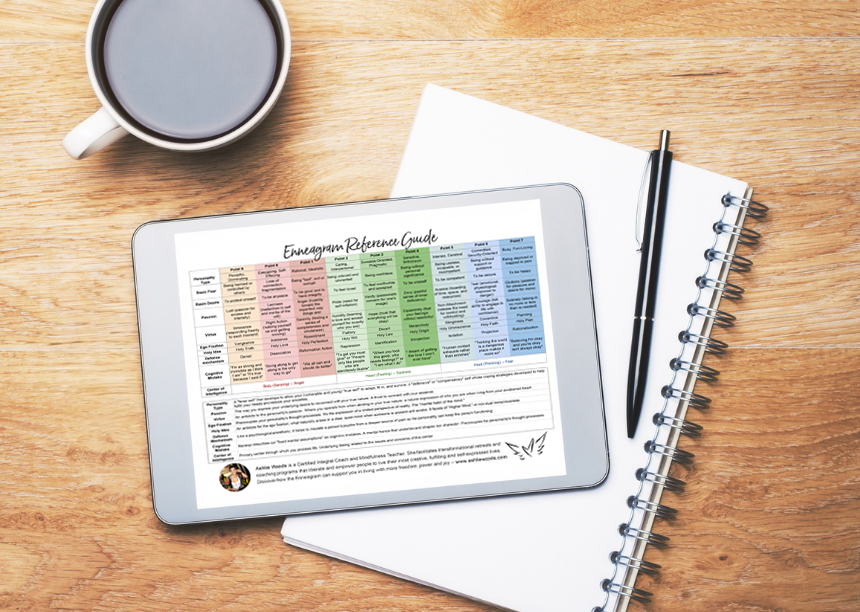Self-Preservation Four — “Tenacity” (Countertype)
The Self-Preservation Four is the countertype of the Four subtypes, and so it may be difficult to identify this person as a Four. Although this Four experiences envy like the other Fours, they communicate their envy and suffering to others less than the other two Four subtypes do. Instead of talking about their suffering, these Fours are “long-suffering” in the sense of learning to endure pain without wincing. These Fours are more stoic and strong in the face of their pain.
Envy is less apparent in the Self-Preservation Four because instead of dwelling in and expressing envy, this Four works hard to get what others have that he or she lacks. Instead of hanging out in their longing in a way that prevents them from taking action, they strive to get “those distant things” that give them the feeling of being able to obtain that which was lost. Whatever they get, however, never feels like enough.
This quick reference guide captures the various aspects of each Enneagram Type including attributes, basic fears, desires, passions, virtues, fixations, defense mechanisms, and more!
Self-Preservation Fours do not communicate sensitivity, suffering, shame, or envy, though they may feel all these things and they have the same depth and capacity for feeling as the other Fours. They learn to swallow a lot without complaining. Endurance is a virtue for them, and they hope their self-sacrifices will be recognized and appreciated, though they don't talk about them very much.
Like the other Fours, Self-preservation Fours feel a need to suffer in the unconscious hope that this will bring them love and acceptance; but unlike the other two, they suffer in silence. Their willingness to suffer without complaint is their way of seeking redemption without talking about them, hoping that others will see this, admire them for it, and help them to meet their needs. Instead of displaying the need to suffer, they have a tendency to deny their envy and bear too much suffering and frustration as a result.
As Naranjo explains, the other two Four subtypes are too sensitive to frustration. They either suffer too much or they make you suffer too much (as a compensation for their suffering). The Self-Preservation subtype is the countertype Four because they go to the other extreme, developing a high capacity to internalize and bear frustration. They make a virtue of resistance to frustration.
Self-Preservation Fours demand a lot of themselves. They have a strong need to endure, so they develop an ability to do without. They put themselves in situations that are tough. They test and challenge themselves. One of my clients with this subtype says that she “throws herself into the fire.” These Fours have a passion for effort- they engage in intense activity, and may often appear strained and tense. They may experience distress if their activity level slows down, and they can be compulsive about making efforts to achieve what they need to survive, even if their efforts don't take them anywhere. In some cases, they may not know how to live without the stress and pressure they put on themselves. They don't allow themselves the experience of living in or from their fragility.
Just as the (countertype) Self-Preservation Three wants to be seen as successful but displays humility about the work they do because they believe outward displays of vanity make them less worthy of respect, Self-Preservation Fours internalize their suffering and strive to get what they want in a more autonomous way than the other Four subtypes.
This Four tends to be a humanitarian with an empathic and nurturing disposition, someone who protests for the sake of others and is sensitive to the needy, the dispossessed, and victims of injustice. This is their way of projecting their pain outward, addressing it through others' suffering instead talking about their own. They try to take care of others' pain or work to ease the “suffering of the world” so they don't have to fully deal with their own suffering.
While the other two Four subtypes can be dramatic, the Self-preservation Four is more masochistic than melodramatic. For this subtype, masochism is the ego or personality's strategy for getting love. Self-Preservation Fours devalue themselves in important ways, which can make it even tougher for them to do all the work they do to try to get the security and the love that they long for. Their attachment to enduring can be seen from the outside as masochistic, but it stems from a desire to earn love and acceptance through being strong and resilient. The motivation of this subtype stems from a desire for the parent to see that the child is not complaining, and instead is being a good boy or girl through not asking for very much.
These Fours may also masochistically enact a need to prove themselves by working against themselves: they make efforts to get what they need and want, but unconsciously work against themselves at the same time. They can be impulsive, but they will control and inhibit their impulses to get recognition. They may want to be happy but they experience an unconscious taboo around happiness. They spend a lot of energy on being afraid of what's happening instead of dealing with problems and making improvements, so they habitually postpone actions necessary to achieving what the want and then blame themselves for doing so. The wear themselves out seeking and striving in ways and places where they know they'll fail, which ensures the perpetuation of a cycle of effort and devaluation. They may be ambitious, but they deny and work against their own ambitions.
Formerly called “Reckless/Dauntless,” but more recently referred to by the name “Tenacity,” these Fours move toward activities that require a large capacity for endurance as a way to earn love, without regard for the pain or the danger they entail.
This Four subtype resembles a One or a Three. Self-Preservation Fours' focus on autonomy, self-sufficiency, and working hard may make them look like a One; however, this Four feels a wider range of emotions- more ups and downs- than Ones,e even if they don't always express their feelings. Self-Preservation Fours can also look like Threes, especially Self-Preservation Threes, in that they work hard to achieve a sense of security and may be anxious; however, in contrast to threes, these Fours will often work at cross-purposes, unintentionally thwarting their own efforts, whereas Threes tend to achieve what they are working toward. Fours also feel their emotions more than Threes do.
Interestingly, this subtype can also look like a Type Seven, which in some ways is the opposite of Type Four, because some Self-Preservation Fours express a need to be light. With all the enduring and efforting these Fours do, they may at times display the high energy characteristics of Sevens, and they may also have a need for fun and playfulness as an escape from having to tough things out all the time. This may account for the fact that there are some Fours who do not seem as melancholy as others- Fours that appear more “sunny” and lighthearted. However, these Fours can be distinguished from Sevens in their greater access to their emotions.
Marcy, a Self-Preservation Four, speaks:
"For much of my life it was difficult for me to feel my true emotions because they were so buried; it just wasn't okay to express emotions when I was growing up- the phase I internalized from my childhood was, “Just suck it up and move on.” Plus, I've always had a stubborn streak, as if I'm the only one who knows how to do something right. My colleagues used to think I was a One because of my need for perfection. And it has sometimes been really difficult for me to connect with the passion of Envy in a meaningful way. But one day when I was thinking of someone I admired and how I came up short by comparison, and I heard my internal voice say “You're not good enough,” I knew I was a Four. I really got the Envy bit then. Now my emotions arise more freely, in small impulses and bursts though, not like the bigger, wilder swings of emotions that you hear about with a lot of Fours.
Although I've meditated for many years, it's still difficult to relax and to be calm in daily activity. It just seems like waste of time not be doing or accomplishing something. Even now when I feel my feelings, I catch myself trying to figure out what I can DO with them. I've always pushed myself to work hard to be successful because I wanted to prove myself by being really good at whatever I do and I have been fortunate in being rewarded for my hard work.
I also see the idea behind the former name of the Self-preservation Four, Reckless/Dauntless, showing up in my behavior. In a way that seems to counter to “self-preservation” I have a penchant for spending money to buy fine things and help others out, sometimes more money than I make. (My mother used to say that I thought money grew on trees.) It's like I get this reckless feeling that money will always be there, so why not spend it on what I love? Plus, I tend to make snap decisions without really thinking it through. For instance, I left my job of 18 years and my 20-year marriage within a month of each other. Of course, the result was some pretty tough years but at least I began to feel my feelings!"
Specific Work For The Self-Preservation Four on the Path from Vice to Virtue
Self-Preservation Fours can travel the path from envy to equanimity by relaxing into their feelings more and sharing them with others, thereby allowing themselves more sources of internal and external support. Envy leads Self-Preservation Fours to believe thy have to go it on their own, but by actively seeking out help from others, they can allow themselves to have more room to breathe and relax. By consciously seeking to embody equanimity, these Fours can develop a place of peace inside themselves- allowing them to feel through and let go of their pain, allowing them to live more rom their fragility, and healing what needs to be healed. Self-Preservation Fours actively release envy by not working so hard to prove themselves and instead allowing for more lightness, fun and pleasure. Rising above then need to suffer silently and tough everything out means going easier on yourself and allowing yourself to embrace all of who you are, not just your ability to endure.
Sourced with permission from The Complete Enneagram by Beatrice Chestnut.
Type 1 Type 2 Type 3 Type 4 Type 5 Type 6 Type 7 Type 8 Type 9
Ashlie Woods
Director of Business Division & Lead Coach at Sourced
Ashlie is a transformational coach, retreat leader, dance lover and Enneagram enthusiast. She is passionate about facilitating experiences that liberate and empower people to live their fullest, more creative and self-expressed lives. She believes there is a life that wants to be lived through you and a purpose only you can fulfill.
She spent 6 years designing and delivering corporate training programs focused on leadership development and company culture before making the bold leap to start her own retreat-based business.
Ashlie now supports heart-centered business owners (coaches, consultants, creatives, healers) to market, sell and deliver their transformational work in the world using their unique magical gifts.




